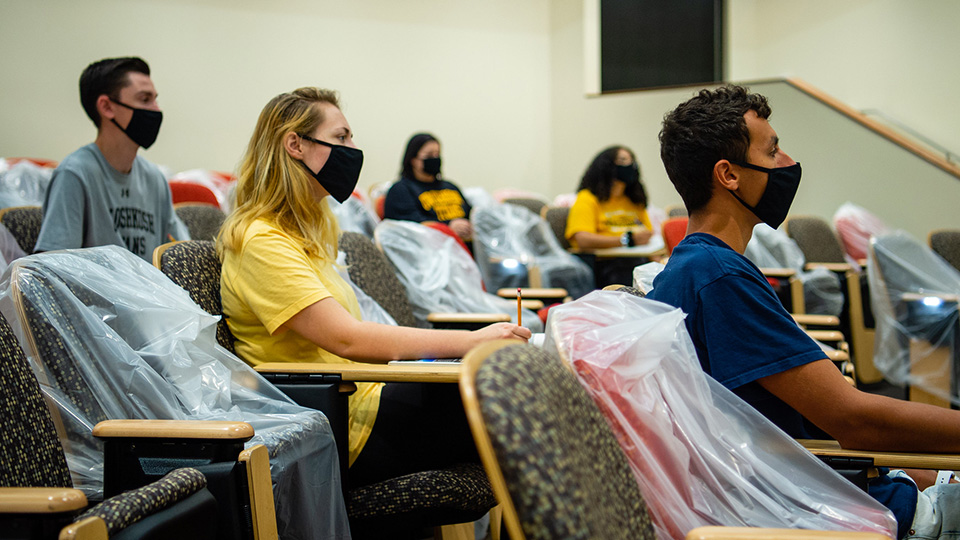Getting through a semester of college can be challenging enough without it being upended by a global pandemic. That’s something students at the University of Wisconsin Oshkosh faced in the spring, with the closing of campus and pivot away from face-to-face classes.
There may be good news, though, about that transition’s impact on student learning. A new study by a pair of UW Oshkosh economics instructors examines the impact the coronavirus disruption had on student performance shows no significant decline when measured against the previous fall.
Economics professor Marianne Johnson and associate economics professor Bryan Engelhardt—along with 2014 UWO grad Martin E. Meder, now an assistant economics professor at Nicholls State University—teamed up for Learning in the Time of COVID, which compares student performance in the semester upended by the pandemic to that of the previous, uninterrupted semester. What they found among more than 1,000 students in introductory macroeconomics, microeconomics and statistics courses is the abrupt end of face-to-face instruction didn’t dramatically impact learning.

Marianne Johnson
Johnson presented the paper at the Midwest Economics Research Group (MERG) conference, held virtually the first week of August. Afterward it was submitted for publication consideration.
Lessons learned
These intro courses were a perfect fit for this kind of study because not only could they look at grades, the economics department requires all students to take a 20-question pre- and post-test to assess general subject knowledge. The tests also are always administered online.
“We were quite surprised that the post-test scores were not really much lower in the spring than they were in the fall,” she said. “Students got about a half-question less correct in the spring compared to students from the previous fall.
“In addition, we saw approximately the same percentage of students fail and withdraw in each semester. This suggests that the closures didn’t really have a big impact on student outcomes, at least for basic subject knowledge or course completion.”

Bryan Engelhardt
Johnson and Engelhardt wanted to take on this project in case this kind of information is needed in the future. The fall semester, which begins Sept. 9 at UWO, comes as thousands of people test positive for COVID-19 nationwide every day and campus outbreaks are unfortunately not beyond possibility.
They started the work shortly after the shift to online-only delivery in March and worked quickly, knowing that over the summer college administrators would likely have tough decisions to make about the fall.
“Understanding the impact of this shutdown on student learning is important for university planning,” Johnson said. “Such efforts can help to clarify the trade-offs associated with choices about continued online learning, re-opening of face-to-face learning and possible short- and long-term re-closures.”
Ups and downs
One surprising finding, Engelhardt said, was that while students’ pre- and post-test scores dipped, overall they earned higher course grades in the virus-impacted semester.
“This may be a bit surprising at first glance as you’d expect people to struggle,” he said. “However, it is likely due to the fact professors were more lenient in their grading due to the circumstance.”
Among the other findings: Seniors were more negatively affected than other students. Statistics students, too, had more trouble than those in macroeconomics or microeconomics.
On the flip side, both women and non-white students saw improvements. The reasons for this Johnson and Engelhardt could only hypothesize. Women and non-white students might learn better in online formats where material can be presented in a variety of ways, Johnson said, versus the traditional “chalk and talk.”
“This is a really interesting finding for us because traditionally women tend to score lower in economics classes,” she said. “So if we can find out what closes this gap in online classes, we can use that information to improve our in-person classes as well. That would be great because women tend to be under-represented in economics at all levels.”
What’s next
The flexibility of both the instructors and the students, it seems, kept the pandemic from causing too much chaos on academic outcomes. That should be a reason for hope for the future—the University community won’t again be caught by surprise.
“What this project showed me was that students are really very flexible learners and even through the stress and anxiety of the semester, they managed to focus and work hard,” Johnson said. “It makes me less worried for the coming semester, because now I know that we can make these adjustments for shorter or longer periods to keep people safe without harming the students’ education.
“It’s definitely a different experience but it’s not necessarily a worse one.”
Learn more:

